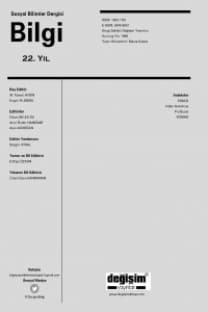The Role of the Military in the Constitution-making Process as a part of Democratic Transition: The Comparative Cases of Turkey and Egypt
Üçüncü Dünya ülkeleri siyasal sistemleri, yasama, siyasi partiler ve resmi çıkar grupları yerine, ordu ve bürokrasi gibi kurumsal siyasi yapıların egemenliği ile karakterize edilmiştir. Gelişmekte olan, ya da sözde “üçüncü dünya” ülkelerinde ordunun siyasetteki rolünü anlamak, bu ülkelerde demokratikleşme hareketlerinin tarihsel süreci iyi okuyabilmek için elzemdir. Bu noktada belirtmek gerekir ki, ordunun siyasette derin ve önemli rol oynadığı en önemli bölgelerden biri Ortadoğu’dur. Bu makalede, Ordunun siyasetle olan ilişkisini Türkiye ve Mısır örneklerini karşılaştırarak inceleyeceğim. Bu çalışma, ordunun teknik olarak sivil yönetimlerin olduğu ülkelerde nasıl yönetimde önemli bir aktör olarak var olduğunu ortaya koymayı amaçlamaktadır. Bu konuda çalışma yapılmasının en önemli nedenlerinden biri, Mısır ve Türkiye’nin demokrasi deneyimi açısından farklılık göstermelerine rağmen, iki ülkenin orduları arasında incelenmesi önemli olan benzerliklerin olması- dır. Diğer önemli neden ise, Steven Cook’un belirttiği gibi iki ülke ordusunun da “Yönetmeden Hükmeden Ordular” olup, ülke siyaseti içinde önemli yere sahip olmalarıdır. Tüm bunlar göz önüne alındığında, bu çalışmanın amacı, gerek tarihsel çalışmalar gerekse günlük gelişmeler ışığında, ordunun Mısır ve Türkiye’de mevcut ve değişmekte olan siyasal rolünü anlamlandırmaktır.
The role of the military in the politics in the developing or socalled “Third World” countries has always been fundamental in order to comprehend the historical process of democratization movements in these countries. To be able to fully grasp the politics, particularly democratic transitions, in the Middle East, it is indispensable to look at the role of the military within the transition process. However, because the democratic transition processes involves different practices, in my research paper, I will focus on the role of military within the constitution-making processes in order to narrow down my research. I have chosen the constitution-making process because, as argued by Özbudun, constitution-making, especially during democratic transitions, is an excellent opportunity to build political institutions that will enjoy broad support from society and its political elites. Both the constitution-making process and its outcome are crucial aspects of the transition to and consolidation of democracy. In this regard, in this study, I have chosen to study Egypt and Turkey comparatively in terms of their military involvement in the constitution making process. It should be noted that in both Turkey and Egypt, previous constitutions were made directly by the military or under military influence through various means, which I will evaluate in my research paper in detailed way. I have chosen these two countries due to two reasons. My initial inspiration is derived from that currently, these two significant countries of the region are in the constitution-making process. When we look at current situation of Turkey, it can be argued that Turkey is in constitution-making process, which is supposed to be totally civilian without the influence of the military. On the other hand, in terms of Egypt, it is argued that following to the Arab Spring, Egypt’s new constitution will be the roadmap to a second republic that most Egyptians hope will be free from the tyranny, corruption, and nepotism, which were the trademarks of Egypt’s political life. The second reason is that despite the fact that Egypt and Turkey differ from each other in terms of longevity of their democratic experiences, the militaries of two countries demonstrate some core similarities, which is noteworthy in terms of comparing the two. Considering all of these, the aim of this study is to see how the military can be a part of the political system, especially in the making of constitution, and to understand the current situation and changing position of the militaries in these countries.
